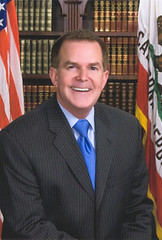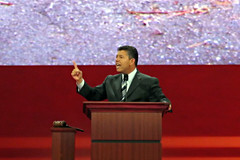That wise Mr. Skelton intones that Prop. 1A is not “a sneaky trick to raise taxes.” I agree. It’s a sneaky trick to drown government in a bathtub.
We touched yesterday on this bigger concern about the lessons that may be learned from the special election battle. It is clear that those anti-tax forces on the right will take credit if the ballot measures, particularly 1A, are defeated, saying that this is proof that California has had enough and the vote signals the rise of the teabaggers. That actually would be a dangerous lesson, mainly because it’s not true, and it’s part and parcel of the vast disinformation around taxes that the cynical forces on the right spare no expense in delivering to the public.
Low-, not high-, income Californians pay the largest share of their income in state and local taxes. Here’s an updated analysis of data we’ve blogged about before that takes into account the temporary tax increase included as part of the February budget agreement.
California is a moderate, not high, tax state when all state and local taxes and fees are taken into account. This results from the fact that California has moderately high state taxes, but low local property taxes due to the impact of Proposition 13 on local property tax collections.
High-income Californians aren’t leaving the state due to higher taxes. In fact, the number of millionaire taxpayers is growing at a rate that far exceeds the increase in the number of personal income taxpayers as a whole.
Over the past 15 years, lawmakers have enacted tax cuts that will cost the state nearly $12 billion in 2008-09. That’s a larger loss than the $11.0 billion 2009-10 temporary increase in state tax revenues included in the February budget agreement.
Moreover, while the tax increases included in the budget are all temporary, regardless of the outcome of the May election, the September 2008 and February 2009 budget agreements included massive corporate tax cuts that are permanent and that will reduce state revenues by approximately $2.5 billion per year when fully implemented.
Saying that tax policy is just plain wacky and inconsistent neglects these plain facts – that the past thirty years of the conservative veto have tilted tax policy, and most everything else, in a very rightward direction.
In actuality, we are seeing a grassroots/establishment divide, where the grassroots in the Democratic Party would like to see some leadership instead of another layer of failed solutions. Unfortunately, because the voices on the right are so loud in their opposition, and because advocates of the special elections would rather frame themselves in opposition to the right, the right is well-positioned to take credit for the defeat of these measures, should that happen. When that’s simply not the lesson that ought to be learned.
The resultant fear is that the feckless Democratic leadership takes that lesson, and then cowers from going down the road of enacting the real structural reforms that represent the only solution possible to lift us from this perpetual disaster. That would be catastrophically wrong. Don’t assume from a short-term setback that the Yacht Party mentality runs the state. People will pay for taxes in exchange for services; that was proven in 2005 and it’s just as true today. Californians elect their leaders to function and yet the structure of government denies them. Dismantle that barrier, and restore democracy to the state.

 Nominee #1:
Nominee #1:  Nominee #2:
Nominee #2: